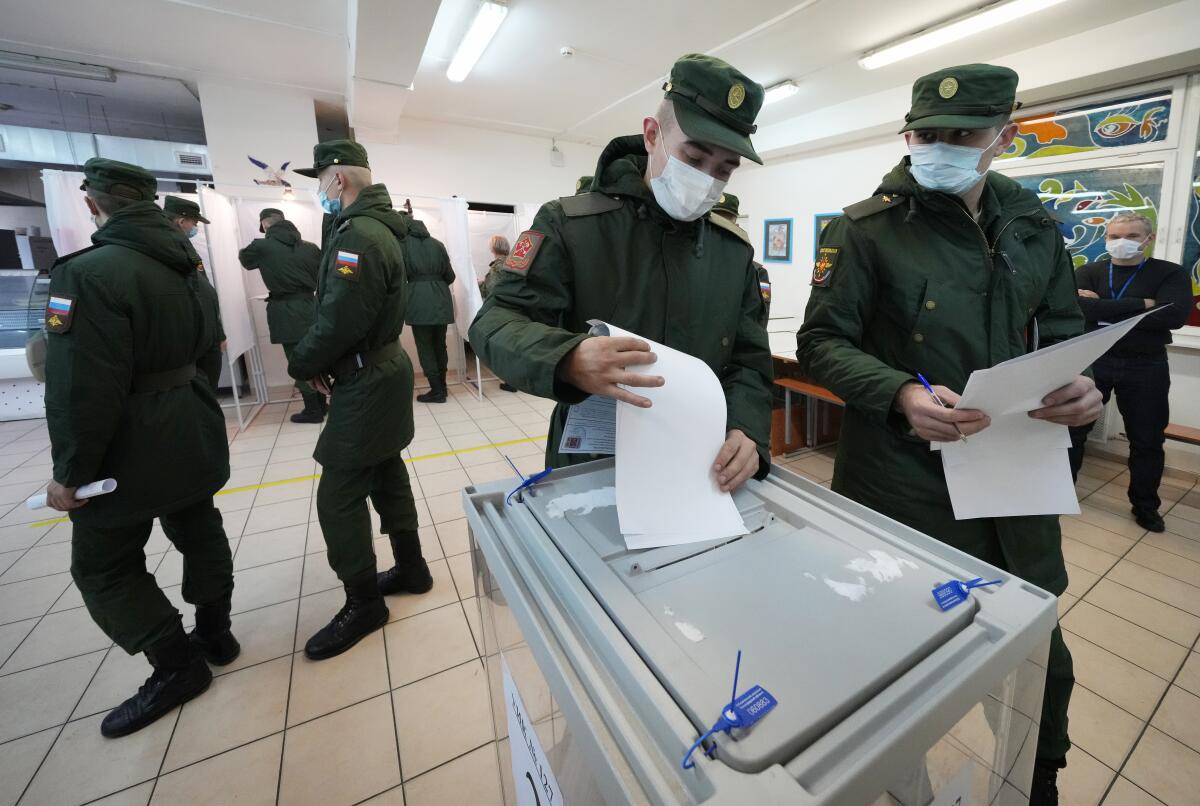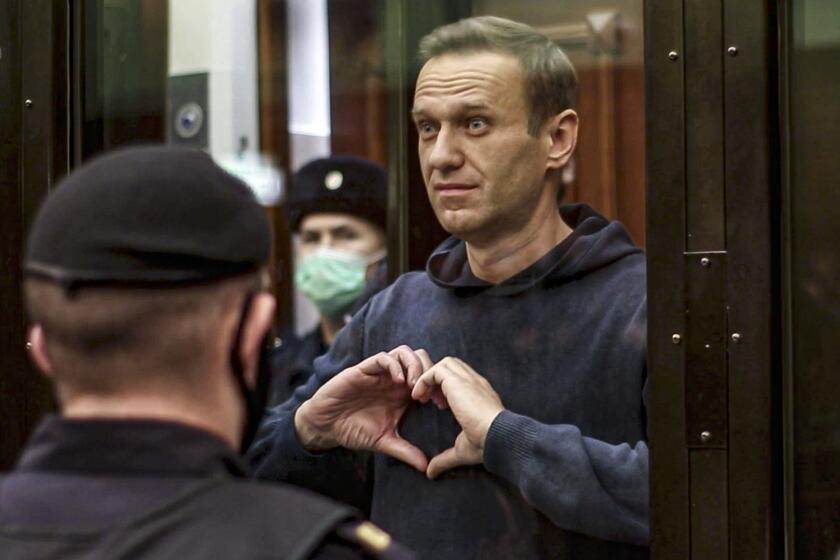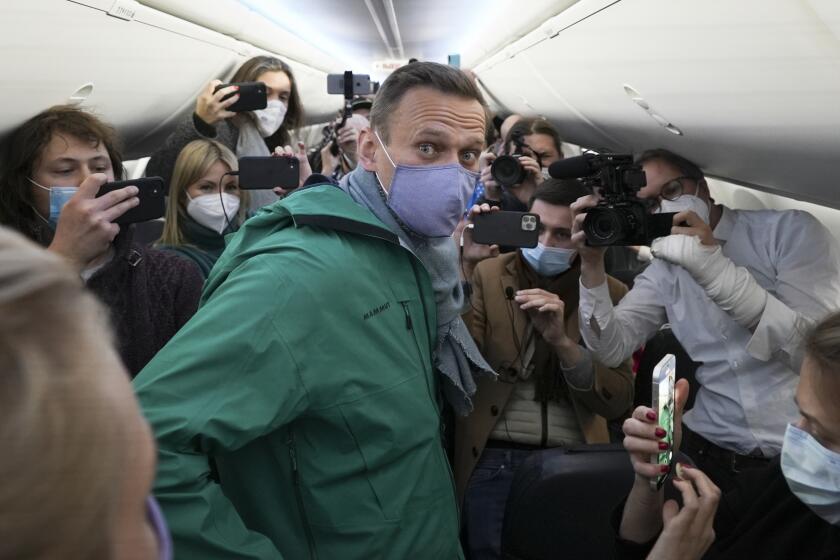Navalny election app removed from Apple, Google stores as Russian polls open

MOSCOW â An app created by allies of imprisoned Russian opposition leader Alexei Navalny disappeared from Apple and Google stores Friday as polls opened across Russia for three days of voting in parliamentary elections.
Russian authorities sought to suppress the use of Smart Voting, a project designed by Navalny to promote candidates most likely to defeat those backed by the Kremlin. This weekendâs elections are widely seen as an important part of President Vladimir Putinâs efforts to cement his grip on power ahead of the 2024 presidential election, for which control of the parliament is key.
Apple and Google have come under pressure in recent weeks from Russian officials who urged them to remove the app that features Smart Voting, saying that failure to do so would be interpreted as interference in the election and threatening the companies with fines.
Last week, Russiaâs Foreign Ministry summoned U.S. Ambassador John Sullivan over the situation.
On Thursday, representatives of Apple and Google were invited to a meeting in the upper house of Russiaâs parliament, the Federation Council. The commission said in a statement after the meeting that Apple agreed to cooperate with the Russian authorities.
Apple and Google have not responded to a request for comment.
The sentencing of Putin critic Alexei Navalny doesnât solve the Russian presidentâs problems.
Google was forced to remove the app because it faced legal demands by regulators and threats of criminal prosecution in Russia, according to a person with direct knowledge of the matter, who also said Russian police officers visited Googleâs offices in Moscow on Monday to enforce a court order to block the app. The person spoke on condition of anonymity because of the sensitivity of the issue.
Kremlin spokesman Dmitry Peskov told reporters Friday that the Putin administration âdefinitely, of courseâ welcomes the companiesâ decision to remove the app. Peskov said the app was âoutside the lawâ in Russia.
In recent months, authorities have unleashed a sweeping crackdown against Navalnyâs allies and supporters in an effort to suppress Smart Voting.
After recovering from poisoning with a nerve agent last year, Navalny was given a 2½-year prison sentence for violating parole over a previous conviction. He says both the poisoning and the conviction were politically motived â charges the Kremlin denies.
Navalny projects supreme confidence that Putinâs authoritarian rule wonât last. Is it denial, theater or truth? Maybe some of each.
His top allies were slapped with criminal charges, and his Foundation for Fighting Corruption and a network of regional offices have been outlawed as extremist organizations. That has exposed hundreds of people associated with the groups to prosecution. Many of Navalnyâs top associates have left the country. About 50 websites that his team ran have been blocked, and dozens of regional offices have been closed.
The authorities have moved to block the Smart Voting website as well, but some internet users can still access it. Navalnyâs team has also created a Smart Voting chat bot on the messaging app Telegram and published a list in Google Docs and on YouTube of candidates whom Smart Voting endorses.
Western tech giants such as Twitter, Facebook and Google have come under pressure this year from the Russian government over their role in amplifying dissent. Authorities have accused the platforms of failing to remove calls for protests, and levied hefty fines against them.
Navalnyâs close ally Ivan Zhdanov on Friday tweeted a screenshot of what appears to be an email from Apple, explaining why the Smart Voting app should be removed from the store. The screenshot cites the extremism designation for the Foundation for Fighting Corruption and allegations of election interference.
âGoogle, Apple are making a big mistake,â Zhdanov wrote.
Start your day right
Sign up for Essential California for the L.A. Times biggest news, features and recommendations in your inbox six days a week.
You may occasionally receive promotional content from the Los Angeles Times.
Leonid Volkov, Navalnyâs top strategist, wrote on Facebook that the companies âbent to the Kremlinâs blackmail.â He noted that the move doesnât affect users who have already downloaded the app, and that it should be functioning correctly.
Peskov on Friday called Smart Voting âanother attempt at provocations that are harmful for the voters.â
As voting got underway in Russia on Friday morning, media outlets reported huge lines and crowds at polling stations, attributing them to state institutions and companies forcing their employees to vote.
Peskov dismissed the allegations and suggested that those queuing at polling stations came there voluntarily because they had to work on the weekend or wanted to âfree upâ Saturday and Sunday.
Anna Trushina, a radiologist at a Moscow hospital, told the Associated Press that she came to a polling station in central Moscow âbecause we were forced by my work. Frankly speaking.â
She added: âAnd I also want to know who leads us.â
More to Read
Sign up for Essential California
The most important California stories and recommendations in your inbox every morning.
You may occasionally receive promotional content from the Los Angeles Times.












